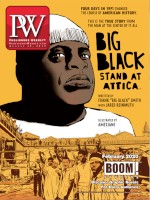If the University of Texas Press exists for one reason, it is this: to publish a comprehensive, definitive history of Texas. Six years in the making, author Steve Harrigan’s 900-page, Big Wonderful Thing (Oct.), may very well be that book. “The last one-volume history of Texas was T. R. Fehrenbach’s Lone Star published in 1968,” said UT Press publicity manager Cameron Ludwick, who noted Fehrenbach’s book was a reflection of its time and marred by selective bias. “Steve’s book is more diverse and inclusive in its view of the state and its history. There is a lot more about the amazing women here and the role of indigenous people in the book, for example. It’s a bit more woke, you might say.”
Harrigan, a longtime contributor to Texas Monthly magazine, is a screenwriter, essayist, and novelist who has been most frequently published by Knopf and Vintage. The book is his 11th, and is in some ways a companion piece to last year’s bestseller God Bless Texas by Lawrence Wright (Knopf), in which Harrigan appears. To mark Big Wonderful Thing’s publication on October 1, Harrigan will be interviewed by Dan Rather at The Bullock Texas State History Museum in Austin.
UT Press, which is printing 35,000 hardcovers, feels that the book has the potential to reach audiences outside Texas. “I think Big Wonderful Thing has a chance of capturing the imagination of readers across the country in the same way Larry McMurtry’s Lonesome Dove did in 1985,” said David Hamrick, director of UT Press. “It is the biggest, most ambitious book release in the history of UT Press, and certainly one of the most important. With our largest initial printing ever, we’re making a statement about the impact that this book might have.”
In addition to touring across Texas, to all the major cities and some smaller ones, Harrigan will travel to Arizona, Oklahoma, and New Mexico, as well as to New York City and Washington, D.C. “Texas is home to four of the most populous, diverse, and fastest-growing cities in the U.S.,” Ludwick said. “It is a mosaic of peoples and their stories, and the history of the state is a microcosm of the history of America itself.”
So far, Barnes & Noble has committed to taking some 5,000–7,000 copies, with a similar number going to indie bookstores. The publishing house will offer an opportunity for buyers to preorder personalized copies for the holidays, as well.
“So many points of U.S. history seem to intersect with or originate in Texas—including many issues that are in the news today and part of an ongoing national discourse,” Ludwick said. “Things such as the Southern border and our relationship with Mexico, immigration policy, Roe v. Wade, the anniversary of the moon landing and NASA, mass shootings, LBJ’s Great Society programs, war, oil, water, major demographic shifts in the population—the list could go on.”
Ultimately, the core audience for the book may not be bibliophiles or those particularly devoted to Texana but the 68,000 history teachers in the state. In Texas, every student is required to take two full years of Texas history, and the hope is that Big Wonderful Thing will become a core reference work.
But Ludwick is keen to emphasize that it’s a trade book and not a textbook, which might subject it to the scrutiny of the state’s controversial board of education, which routinely censors works. That said, she noted that the book is “an academic title” and has been peer reviewed “like all university press books,” and an emphasis was placed on finding diverse readers who scanned for sensitive issues. UT Press is planning significant marketing outreach through the Texas Library Association and the Texas Council for Social Studies.
“The future generations of Texans deserve a history that is more inclusive,” Ludwick said. “We feel as a university press that our role is to be custodians whose job is to protect the public history.”



 Volume 266
Issue 33
08/19/2019
Volume 266
Issue 33
08/19/2019





